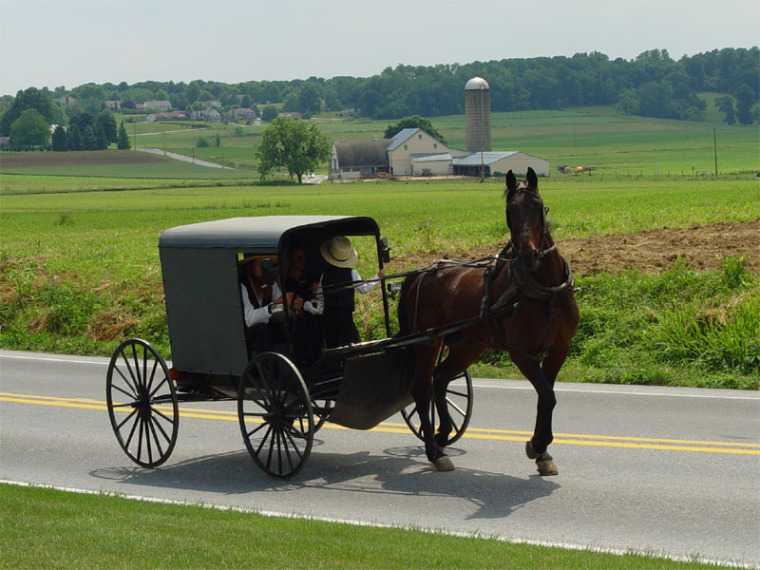Scientists find anti-aging gene in secluded Amish community in Indiana

Scientists have found a genetic mutation in an Amish community that is believed to combat against aging and protect them from Type 2 diabetes.
A team of scientists, headed by Douglas Vaughan, a medical researcher at Northwestern University, tested 177 people from the Amish community of Berne, Indiana and found 43 people with a mutated SERPINE1 gene.
The mutation described in their findings affects a protein regulated by SERPINE1 called plasminogen activator inhibitor-1, or PAI-1, which helps dissolve blood clotting.
According to Science Alert, mutations in SERPINE1 can lead to a rare genetic bleeding disorder, but the affected individuals in the community appear to be susceptible to it.
Carriers of the mutation had a 10 percent longer lifespan, lower incidence of diabetes and lower insulin fasting levels, compared to the general Amish population.
The researchers also found that there is a small indication of lower blood pressure and potentially more flexible blood vessels among the carriers.
"For the first time we are seeing a molecular marker of aging (telomere length), a metabolic marker of aging (fasting insulin levels) and a cardiovascular marker of aging (blood pressure and blood vessel stiffness) all tracking in the same direction in that these individuals were generally protected from age-related changes," Vaughan said.
The Amish, a group of traditionalist Christians known for shunning modern technology, trace back their origins to the Protestant Reformation in Europe. The ancestors of the community in Berne, Indiana reportedly emigrated in the middle of the 19th century from Berne, Switzerland.
According to Daily Mail, the Amish (immediate family and relatives) in Berne, Indiana, have been genetically and culturally isolated, and most of them are at least distantly related.
The researchers believe that the mutation was introduced into the Amish kindred when farmers from Switzerland moved into the area, and two of their descendants, who carried the mutation, married into the Amish community.
Vaughan noted that other Amish communities outside of Berne do not carry the said mutation. "This is the only kindred on the planet that has this mutation. It's a 'private mutation," Vaughan said.
"We hope to be able to revisit them regularly and do additional testing to look at the velocity of aging in this kindred and unearth more details about the protective effect of this mutation," he added.
Northwestern University researchers are now collaborating with Japan's Tohoku University to develop and test an experimental drug that would inhibit the action of PAI-1.
The drug has reportedly passed basic safety trials and is now being tested in phase 2 trials in Japan.
Meanwhile, the Northwestern University is seeking approval from the FDA to begin trial in the U.S. within the next six months.
 Christians don't have to affirm transgenderism, but they can’t express that view at work: tribunal
Christians don't have to affirm transgenderism, but they can’t express that view at work: tribunal Archaeology discovery: Medieval Christian prayer beads found on Holy Island
Archaeology discovery: Medieval Christian prayer beads found on Holy Island Presbyterian Church in America votes to leave National Association of Evangelicals
Presbyterian Church in America votes to leave National Association of Evangelicals Over 50 killed in 'vile and satanic' attack at Nigerian church on Pentecost Sunday
Over 50 killed in 'vile and satanic' attack at Nigerian church on Pentecost Sunday Ukrainian Orthodox Church severs ties with Moscow over Patriarch Kirill's support for Putin's war
Ukrainian Orthodox Church severs ties with Moscow over Patriarch Kirill's support for Putin's war Islamic State kills 20 Nigerian Christians as revenge for US airstrike
Islamic State kills 20 Nigerian Christians as revenge for US airstrike Man who served 33 years in prison for murder leads inmates to Christ
Man who served 33 years in prison for murder leads inmates to Christ


 Nigerian student beaten to death, body burned over ‘blasphemous’ WhatsApp message
Nigerian student beaten to death, body burned over ‘blasphemous’ WhatsApp message 'A new low': World reacts after Hong Kong arrests 90-year-old Cardinal Joseph Zen
'A new low': World reacts after Hong Kong arrests 90-year-old Cardinal Joseph Zen Iran sentences Christian man to 10 years in prison for hosting house church worship gathering
Iran sentences Christian man to 10 years in prison for hosting house church worship gathering French Guyana: Pastor shot dead, church set on fire after meeting delegation of Evangelicals
French Guyana: Pastor shot dead, church set on fire after meeting delegation of Evangelicals ‘Talking Jesus’ report finds only 6% of UK adults identify as practicing Christians
‘Talking Jesus’ report finds only 6% of UK adults identify as practicing Christians Mission Eurasia ministry center blown up in Ukraine, hundreds of Bibles destroyed: 'God will provide'
Mission Eurasia ministry center blown up in Ukraine, hundreds of Bibles destroyed: 'God will provide' Church holds service for first time after ISIS desecrated it 8 years ago
Church holds service for first time after ISIS desecrated it 8 years ago Burger King apologizes for 'offensive campaign' using Jesus' words at the Last Supper
Burger King apologizes for 'offensive campaign' using Jesus' words at the Last Supper Uganda: Muslims abduct teacher, burn him inside mosque for praying in Christ’s name
Uganda: Muslims abduct teacher, burn him inside mosque for praying in Christ’s name